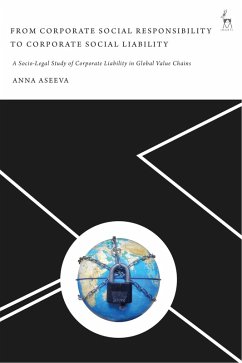This book provides a critical socio-legal study that brings together the latest scholarly advances on corporate social responsibility, and, at the same time, addresses the pressing issue of corporate liability for harmful acts across the supply and production chains.
Corporations have seldom been held responsible and virtually never liable for the acts of their subsidiaries and subcontractors. Actors as different as workers, investors, individual consumers, and shareholder activists claim that corporations should accept greater responsibility for communities and environments affected by their activities.
The book argues that a global value chain's head corporations remain immune to any liability because of the 'economically dependent-legally independent' relationships between core corporations and their periphery suppliers and subcontractors. To tackle this problem, globally, the author acknowledges that 'we' as a society need to reduce the economic dependence as described above - which is far too excessive - by ensuring a level playing field both economically and socially. More concretely, she argues that in order to realise transnational corporate liability, 'we' as lawyers need to find a way (or ways) to establish legally effective relationships between head corporations and their economically dependent entities.
Readers of this book will be able to export the concept of corporate social liability, developed in the context of value chains, and apply it to other contexts involving corporate activities where they need to tackle unrestrained corporate freedom and make global businesses responsible and socially useful.
Corporations have seldom been held responsible and virtually never liable for the acts of their subsidiaries and subcontractors. Actors as different as workers, investors, individual consumers, and shareholder activists claim that corporations should accept greater responsibility for communities and environments affected by their activities.
The book argues that a global value chain's head corporations remain immune to any liability because of the 'economically dependent-legally independent' relationships between core corporations and their periphery suppliers and subcontractors. To tackle this problem, globally, the author acknowledges that 'we' as a society need to reduce the economic dependence as described above - which is far too excessive - by ensuring a level playing field both economically and socially. More concretely, she argues that in order to realise transnational corporate liability, 'we' as lawyers need to find a way (or ways) to establish legally effective relationships between head corporations and their economically dependent entities.
Readers of this book will be able to export the concept of corporate social liability, developed in the context of value chains, and apply it to other contexts involving corporate activities where they need to tackle unrestrained corporate freedom and make global businesses responsible and socially useful.









